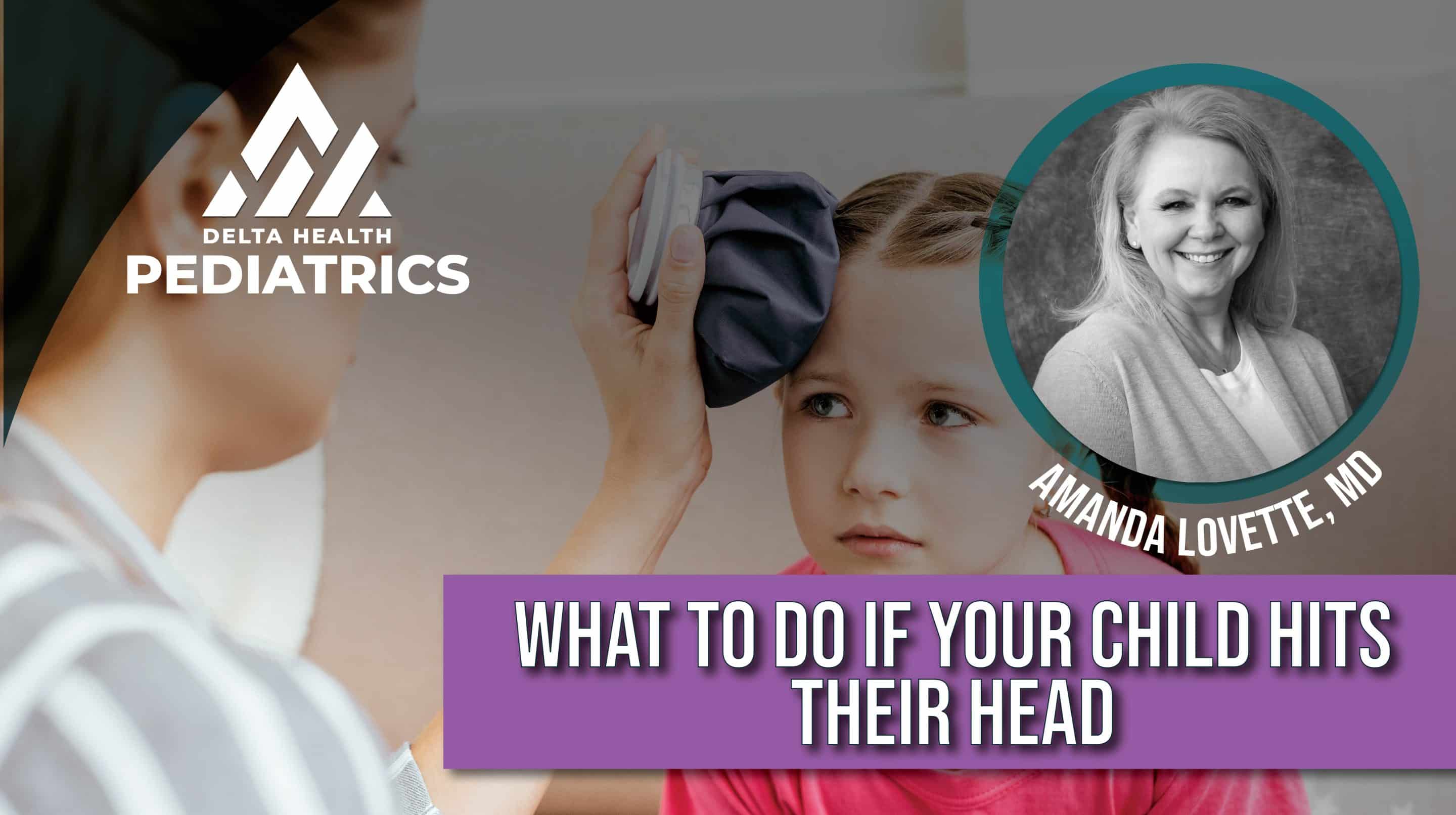By: Dr. Amanda Lovette, Delta Health Pediatrics
*This article is not a substitute for medical advice. Contact your child’s pediatrician if you have questions. If you need immediate medical attention, call 911 or visit the Emergency Department.
One of the most common issues an ER physician might see in children is concerned parents coming in because their children hit their heads. Universally, parents are concerned that there is unseen damage percolating in their child’s head and the worst possible outcome is likely. They almost always think immediately of the ER and head there promptly. At times, that is absolutely the correct thing to do, but there are other times when watchful waiting may be a more appropriate response. Always use your best judgment and, as such, call your provider for further advice or seek care if you have concerns about your child’s health and safety.
First, let’s talk about head injury and when it is very appropriate to seek medical care after a head injury:
- Your child has vomiting, and it persists.
- Your child has a headache that worsens with time.
- Your child has a cut on the head or face
- Your child has lethargy – meaning your child doesn’t respond to you without difficulty.
- Your child is very sleepy or really wants to fall asleep when he wouldn’t otherwise normally be sleepy.
- Your child won’t stop crying and isn’t consolable, or refuses to eat when he should be hungry
- Your child has blood coming out of her ears, or a runny nose that wasn’t present before the injury
- One pupil is a different size than the other (some children have this normally – it could be an issue only if it happens after a head injury)
- Your child starts having convulsions or seizures.
- Your child, who would normally have good balance, cannot seem to keep his balance or falls really easily.
- Your child has new onset slurred speech, acts in really unusual ways, or states his vision is blurry.
- Your child is confused or doesn’t recognize you or other familiar people.
These are all very appropriate reasons to seek medical care for your child if he or she has hit her head. Your doctor may advise you just to monitor your child, or your doctor may determine that imaging, like a head CT, might be indicated to make sure there is no more severe damage.
What should you do if your child bumps her head?
If your child is a healthy child without any medical history such as a seizure disorder, or bleeding disorder, is developmentally delayed, has neck injuries, or is not younger than 2, and suffers a light bump on her head, it is appropriate to monitor your child closely for the above signs and seek immediate care if you see any of them. Your child will likely cry but should calm down within 10 minutes. There may be swelling at the site of the head injury – you can apply a cold compress to help the swelling go down. Make sure a responsible adult is monitoring your child for at least 24 hours after the injury so that care can be sought immediately if there are changes in his condition.
Let’s discuss a few widely held beliefs that in actuality have very little basis in fact:
- It is commonly believed that you shouldn’t let your child sleep after a head injury. This might be true for a toddler who cannot tell you how he feels, but for an older child or teenager who can express their physical feelings, keeping them from sleeping may not be helpful. Sleep is the main way our bodies heal. Not allowing sleep can make the recovery process more difficult for the child. Your provider might recommend you lightly wake your child every few hours after an injury just to be sure they can recognize you and move and respond appropriately.
- Some people believe that if their child didn’t “blackout”, then he cannot have a concussion. In fact, children can suffer from concussions even if there wasn’t a lack of consciousness. Signs of a concussion can also include, but are not limited to, lack of memory of the injury, difficulty concentrating, headache, throwing up, new onset depression or anxiety, or inability to remember common facts, like the president’s name or today’s date. Seek care from a healthcare provider if you believe your child has suffered a concussion.
- MRIs and CT scans can NOT rule out concussions. These are diagnosed by clinical exams and mental status tests.
- A bump on the head that goes out doesn’t necessarily mean that your child is fine and you shouldn’t worry. The scalp is very vascular and bleeds easily and bumps, even very large bumps can develop quite quickly. The bumps are always “going out” but don’t really indicate anything about the health of the underlying brain. Look for the above signs to know if you should seek care or call your child’s healthcare provider.
If you have further questions or concerns, you can contact Delta Health Pediatrics at 970.546.4000 or visit deltahealthco.org/delta-health-pediatrics/.


